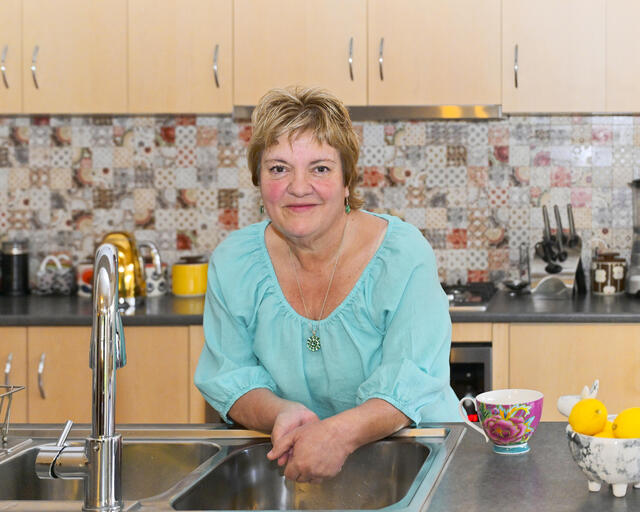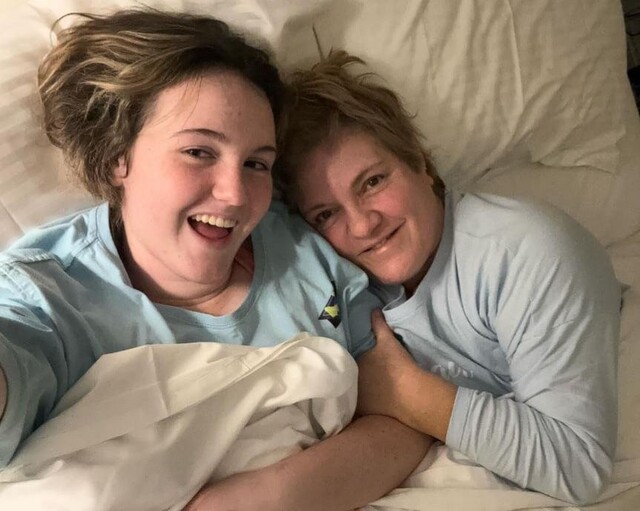Former Epworth Geelong theatre nurse Kellie Devlin was diagnosed with multiple myeloma, a type of blood cancer, seven years ago. She speaks with Jena Carr about the importance of raising awareness for blood cancer during Blood Cancer Month this September.
A cancer diagnosis can come as a surprise to many people, a reality that former theatre nurse Kellie Devlin, 57, knows too well.
The Lara wife and mum worked as a nurse at the Epworth Geelong Hospital for 23 years, a job she felt drawn to from a young age.
Kellie often worked long hours and had to wear a lead skirt, vest and collar as part of her role in the pain theatre, where procedures were done for people with chronic pain and spinal implants.
“It’s really long hours that you work and the lead’s heavy, so my back was always sore and sometimes my legs were sore, but I didn’t think anything of it,” she said.
“It was November 2017. My husband is a truck driver, and he’d left for work. I was standing at the bench (in the kitchen) watching the morning news at about 5am and having a coffee.
“I must have shifted my weight, and what I didn’t know was that my leg was about to break due to a tumour that was there. I shifted my weight, and just the most excruciating pain hit.
“I dropped my coffee and then lost the feeling in my leg. I thought, ‘oh my God, I’m having a stroke’. I fell and hit the floor screaming for my daughter, who was only 9, to wake up.”
When Kellie got to the hospital, doctors believed she had sciatica (pain that travels along a nerve in the leg) or something wrong with her back.
It wasn’t until she had an x-ray at Geelong’s Grace McKellar Centre that Kellie learned the truth about what was happening.
“Turns out I had a massive tumour in my leg. A whole lot of blood tests and everything later, doctors said that I’ve got multiple myeloma,” she said.
“I said, ‘Well, what’s that?’ and they said that it’s a blood cancer. I said, ‘Well, am I going to die?’ and my GP said, ‘I don’t know’.
“The following year (2018), I had a stem cell transplant where they give you lead-up chemotherapy and then a massive hit of chemo to kill off your bone marrow.”
Myeloma is a blood cancer that forms in the body’s plasma cells and attacks the bones. According to the Leukaemia Foundation, there is currently no cure for the disease.
Close to 18 months after the initial stem cell transplant and after returning to work, Kellie’s cancer returned. She then had to go through another stem cell transplant procedure in 2019.
“I was really sick and spent Christmas in hospital, which was a new low point with my daughter sitting on the bed opening her presents in tears,” she said.
“In 2020, I spent a lot of time sick and found out that I had relapsed again. I was fortunate enough to be offered a clinical trial at St Vincent’s Hospital Melbourne…and I started that in November 2021.
“It was during COVID, so my family couldn’t come in. When I was admitted, I had three broken ribs, a broken collarbone and a broken jaw.
“I couldn’t shut my mouth, and they were going to put pins in my top and bottom teeth to try and move my jaw back together, and that’s apart from all the other broken bones I’ve had.
“Last year, I also spent a lot of October, November, and December in hospital with infections and then pneumonia.
“During that time, one of my close friends was also in hospital and passed away with the same thing, so that was very confronting and took me a bit of time to get my head around.”
Within a month of undertaking the trial in Melbourne, Kellie’s cancer symptoms had reduced, and she said she was glad to have the chance to participate in the trial.
“I just thank God for clinical trials. At that stage (before the trial) I thought I’m in real trouble as they’d kind of run out of other options,” she said.
“My haematologist, Hang Quach, is a professor of haematology and lectures all over the world. She’s an expert on myeloma and just an angel.
“Although it’s a crappy diagnosis, I’m very fortunate to have beautiful people around me and an amazing doctor. Who better than to have the queen of myeloma caring for me.”
Kellie said that, after dealing with her cancer diagnosis, relapses, and treatments, the most challenging time for her was telling her daughter Daisy that she had cancer.
“The worst day in a parent’s life is talking to their child about death. I wouldn’t wish that on my worst enemy,” she said.
“My husband and I sat her down (when she was 9) and had a conversation with her and said, ‘What does cancer mean to you?’ and she said, ‘I’ve heard that word, as long as it doesn’t mean you’re going to die’.
“I said, ‘Well, you know Mum is a nurse, and I’ve looked after people with different cancers’, and she just looked at me crying and saying, ‘You’ve got cancer, haven’t you?’.
“What do you do at that stage? You just want to say no. But I thought that if I lie to her, she’s never going to trust me again. So, that was pretty awful.”
September is Blood Cancer Month, and Kellie said it was important to raise awareness of the different types of blood cancers, such as myeloma.
“Myeloma flew under the radar. Everyone’s heard of leukaemia, but a lot of people, including me as a nurse, haven’t heard of myeloma,” she said.
“We’re a small family of three. My parents have both passed away. Daisy’s an only child, and I want to see my baby grow up. She’s actually 16 in two weeks, so that’s a bit of a milestone.
“When you think about dying; we’re all going to die, and I suppose that’s what I’ve had to come to terms with. You have to go with that and live as well as you can.
“It’s always there, but just try not to focus on it. Because if that’s all I focused on, I wouldn’t enjoy my life. I have to try and look for some positives.
“I want to live, and I want to see my daughter get married. I want to grow old with my husband. So, people being aware and companies helping will hopefully help us achieve that.”










